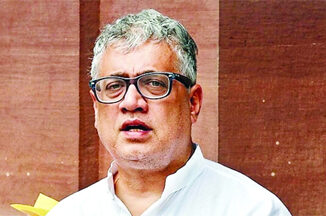
London (TIP)- Europe’s inflation took a positive turn with a significant drop to 6.1%, but prices are still posing a pinch to shoppers who are yet to see real relief in what they pay for food and other necessities.
The annual figure in May eased from 7% in April for the 20 countries that use the euro currency, the European Union’s statistical agency Eurostat said Thursday.
It was a welcome sign that the explosion in price increases — which peaked in record double digits last October — is heading in the right direction.
But economists warned that it will be many months before disgruntled consumers see more normal levels of inflation reflected on price tags in shops. While prices are rising more slowly, they are coming on top of already-high costs triggered by Russia‘s war in Ukraine and other factors.
Relief is far off for people like 76-year-old Brigitte Weinbeck, who was shopping this week at an open-air market in Cologne, Germany.
“I shop more consciously — for instance, I always make a plan at the beginning of the week about what I’m going to cook and when and then I go shopping,” she said. “Otherwise, you sometimes make impulse purchases.”
The food bank at Berlin’s St. Wilhelm Roman Catholic Church, meanwhile, has gone from serving 100-120 households before the war in Ukraine to 200.
“Now, there are people coming who are at the limit of their income,” coordinator Christine Klar said. “They say the prices have risen so much now. And now they know, or heard, that they are entitled to use the food bank, so now they come.” Food prices in the eurozone rose by a painful 12.5% in May from a year earlier, but still eased from the 13.5% increase recorded in April. Key to the lower overall inflation figure was energy prices, which fell 1.7% from a year ago following an increase of 2.4% a month ago.
Core inflation, which excludes volatile food and energy, fell to 5.3% from 5.6% in April. That figure is seen as the better indication of price pressures in the economy from demand for goods and higher wages. It’s high enough that the European Central Bank is expected to approve another interest rate increase at its June 15 meeting.
Inflation fell in the three biggest economies where the euro is used: Germany to 6.1%, France to 5.1% and Italy to 7.6%. The decline was “broad based, with food, energy and core inflation all contributing to the easing,” economist Rory Fennessy wrote at Oxford Economics.
Inflation took off in mid-2021 as fears that Russia might invade Ukraine sent natural gas and oil prices higher on fears of losing Russian supplies and as the global economy bounced back from the worst of the pandemic, straining supplies of parts and materials.
The energy and supply choke points have eased, but higher prices have kept spreading through the economy as workers demand better pay and companies find they can raise prices to cover increasing costs. Source: AP





Be the first to comment